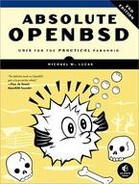The OpenBSD Community
OpenBSD is more than just a collection of bits. It’s a community of users, developers, and contributors, with a single central dictator—er, coordinator. And this community can be a bit of a shock for anyone who doesn’t know what to expect.
How can individuals scattered all over the world create, maintain, and develop an operating system, let alone build a community? Almost all discussion occurs through email and online chat. The process is slower than talking face-to-face, but it’s the only cost-effective way for a large group of people in every time zone to communicate in a reasonable fashion. Email and chat also offer written records of discussions. If you want to participate in OpenBSD development, you must be comfortable with email. (There are OpenBSD-dedicated web forums, but they’re outside the main community.)
The OpenBSD community has four tiers: users, contributors, committers, and the coordinator.
OpenBSD Users
Many open source operating systems put a lot of effort into growing their user base, evangelizing, and bringing new people into the Unix fold. OpenBSD does not.
Most open source Unix-like operating system groups do a lot of pro-Unix advocacy. Again, OpenBSD does not.
The communities surrounding other operating systems actively encourage new users and try to make newbies feel welcome. OpenBSD specifically and deliberately does not.
The OpenBSD community is not trying to be the most popular operating system—just the best at it what it does. The developers know exactly who their target market is: themselves. If you can use their work, that’s great. If not, go away until you can.
The OpenBSD community generally expects newcomers to be advanced computer users. The members have written extensive OpenBSD documentation, and expect newcomers to be willing to read it. They’re not interested in coddling new Unix users and, if pressed, will say so—often bluntly and forcefully. They will not hold your hand. They will not develop new features to please users. OpenBSD exists to meet the needs of the developers, and while others are welcome to ride along, the needs of the passengers do not steer the project.
OpenBSD Contributors
Contributors are OpenBSD users who have the skills necessary to add features to the operating system, fix problems, write documentation, or accurately report problems. Problems range from typographical errors in the documentation to system crashes. Almost anyone can be a contributor. In fact, the community has even accepted problem reports from me, and resolved them within hours.
Every OpenBSD feature is present because some contributor took the time to write the code for it. Contributors who submit careful, correct fixes, or who provide useful problem reports, are welcome in the OpenBSD community. And if a contributor submits enough fixes of sufficient quality, he might be offered the role of committer.
OpenBSD Committers
Committers have write access to the main OpenBSD source code repository. They can make whatever changes they deem necessary for their OpenBSD projects, but are answerable to each other and to the project coordinator. Most committers are skilled programmers who work on OpenBSD during their own time.
While being a committer seems glamorous, the role carries a lot of responsibility. If a committer breaks the operating system or changes something so that it conflicts with OpenBSD’s driving “vision,” he must fix it. Committers try to avoid breaking things, and frequently make their work available on websites and mailing lists before it’s integrated into the main OpenBSD source code collection, allowing interested people to preview, test, and double-check their work.
Many committers have very specific coordination roles within OpenBSD. For example, quite a few hardware architectures have a point man for issues that affect that hardware, the compiler has a maintainer, and so on. These committers have earned that position of trust in the community.
OpenBSD Coordinator
Theo de Raadt started OpenBSD in 1995 and still coordinates the project. He is the final word on how the system should work, what is included in the system, and who gets direct access to the repository. He resolves all disputes that contributors and committers cannot resolve among themselves. Theo takes whatever actions necessary to keep the OpenBSD Project running smoothly. If something should ever happen to Theo, the project does have plans for replacing him.
Building the OpenBSD organization around a central benevolent dictator avoids a lot of the management problems other large open source projects have.
If you decide to work on OpenBSD, you must accept Theo’s decisions as final. A contributor who doesn’t accept the project’s leader won’t remain with the community for long. Theo might have a big stick, but as he is the acknowledged project leader, he doesn’t need to use it nearly as often as you might think.
